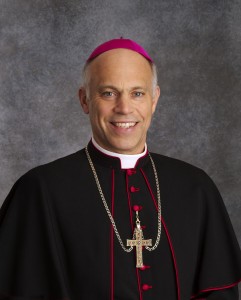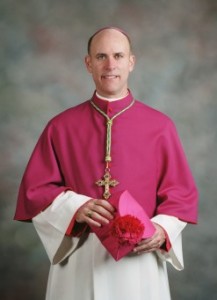Friday Fast: For married couples and families struggling financially
Printable version (en español)
Intention: For married couples and families who are struggling financially or living in poverty – that God would provide for their needs and increase their trust in Him.
Reflection: Marriage matters to society. When a bride and groom become husband and wife on their wedding day, a new family is formed. Each family is an interdependent mini-society, born from the communion of husband and wife. As Bl. John Paul II said, the family is a “cradle of life and love.” It is the place where we learn to love and be loved.
For good reason, then, marriage and the family play a key role in Catholic social teaching (see ch. 5). The Church’s interest in marriage is not limited to religious concerns because marriage is not just a religious reality; it has major social implications, too. The Church’s concern for the poor overlaps with her concern for marriage because family breakdown has economic implications. For example, sadly, single mothers and their children are more likely to suffer from economic hardship.
Because marriage impacts each and every person in society, the Church strives to promote, strengthen, and defend marriage and the family. We pray today for all families who are struggling financially, that they would know the peace of the Lord.
Did you know? Today, we celebrate the feast day of St. Vincent de Paul. Born in France in 1580, St. Vincent was renowned for his work with the poor and sick. He founded both the Congregation of the Mission (known commonly as the Vincentians) and the Daughters of Charity. St. Vincent’s holy life inspired Bl. Frederic Ozanam to found the Society of St. Vincent de Paul, which now serves the poor in 148 countries.
More:
- Learn about the Bishops’ Call to Prayer for Life, Marriage, and Religious Liberty
- Sign the pledge to fast on Fridays for life, marriage, and religious liberty
- Join the Call to Prayer Facebook event
Archive
Is defending marriage just about injuring others? No. Marriage matters for everyone. (5th of 7 in a series)
Note: This post is fifth in a series of posts about what we can learn from the Supreme Court’s June 2013 DOMA decision, and how that can help us better promote and defend marriage. This series is based on a July 2013 talk by staff of the USCCB Subcommittee for the Promotion and Defense of Marriage.
Earlier posts:
- #1: Background to the Supreme Court cases
- #2: Unspoken assumptions & reframing the debate
- #3: What do you say that marriage is? The need for a comprehensive vision
- #4: The flawed anthropology of “sexual orientation”
————————————————————————————————
PART ONE: What we can learn from the Supreme Court
Post #5: Is defending marriage just about injuring others? No. Marriage is good for everyone.
In its ruling on DOMA, the Supreme Court said that laws that define marriage as the union of one man and one woman are inherently suspect because their only justification is a desire to “injure” a class of persons. Indeed, the Court does not mince words when it talks about the purpose of DOMA: “The principle purpose and the necessary effect of this law are to demean those persons who are in a lawful same-sex marriage” (p. 25, emphasis added). DOMA gave a “stigma” to such persons (p. 21) and it instructed them that their marriage is “less worthy” than other marriages (p. 25).
Worse, the Court said that DOMA – and presumably any law that defines marriage as the union of a man and a woman – lacks a “legitimate purpose” (p. 25). In other words, no rational reason exists that would justify a law defining marriage as the union of a man and a woman. No reason, for example, such as the fact that only male-female relationships are capable of conceiving children, who have a vested interest in being raised by their married father and mother.
In his dissent, Justice Scalia rails against the Court’s dismissal of marriage proponents’ arguments as merely cloaks for irrational prejudice against those who desire to marry someone of the same sex. Scalia says that the Court thus made those who still argue for man-woman marriage “enemies of the human race” (p. 21, Scalia dissent). He writes, “In the majority’s judgment, any resistance to its holding is beyond the pale of reasoned disagreement” (p. 21). In other words, the book is closed. There is no room for disagreement. Scalia also said, “In the majority’s telling, this story is black-and-white: Hate your neighbor or come along with us” (p. 25).
Clearly that attitude is a daunting obstacle for those of us who seek to promote marriage as the union of one man and one woman.
Tip number four: Emphasize that promoting and defending marriage is good for everyone.
As stated already, one challenge we face is criticism that the Church is “obsessed” with marriage because she really only cares about married people; she is pro-married couples, but anti-everyone else. Of course we know this is false.
Catholic Social Teaching is a great help here, because it is very clear that marriage and the family matter to society. (And there is no question at all that “marriage” means what it always had for the Church: the union of one man and one woman). For example, the Compendium of the Social Doctrine of the Church [CSDC] describes the family (founded on marriage) as “the primary place of humanization” (no. 209), the “cradle of life and love” (no. 209), the “first and vital cell of society” (no. 2), the place where “one learns social responsibility and solidarity” (no. 213) and so on.
Marriage benefits society, first, by being what it is. The Compendium speaks beautifully of the “dynamism of love” that radiates out from the irrevocable vow that husband and wife give to each other (CSDC, no. 221). Their “yes” to each other lays the foundation for them to say “yes” to any children God gives them, and to say “yes” to all persons, seeing them as valuable for their own sake and not for what they can do and contribute.
And marriage of course benefits society by giving children the best possible chance to be born into a situation where their mother and father have already committed to each other and to any children born from their union. Not every married couple is blessed with children, but every child has a mom and a dad. As the quip goes, “When a child is born, chances are there’s a mother close by. The problem is: Who’s the father?” Marriage solves this cultural dilemma by bringing men and women together before children are conceived, to lay a solid foundation where they can be welcomed into a “sanctuary of life” (CSDC, no. 231ff).
Another way to show that marriage matters for everyone, and is not a mean-spirited jab at those who can’t or won’t get married, is to point out that all of us are sons or daughters. All of us have a father and a mother, and whether those two persons were and still are married to each other makes a great impact on our lives. This is a universal truth, and one that the Church argues should matter for public policy.
Finally, the fact that marriage matters for everyone gives us a way to connect promoting and defending marriage with the New Evangelization. Yes, the New Evangelization means reaching and re-catechizing those who have been baptized but not formed. Those who serve in various ministries can probably think of ways that they are doing this kind of evangelization. Our Catholic people certainly need instruction in the full meaning of marriage; one poll in March 2013 found that over half of Catholics support redefining marriage (although critics pointed out that only 36% of regular mass-goers said they were for redefining marriage). And they need to be given encouragement to stand firm in these teachings, a difficult task in the face of the Supreme Court’s judgment that defending marriage means harming and demeaning others. We of course need to dig deep into the rich, life-giving teaching of the Church on marriage and give it generously to those within the Church.
But there is another connection between the New Evangelization and marriage. In the face of such severe challenges to marriage, it can be tempting to throw up our hands and retreat from the public square, shutting the Church doors tight and vowing to “protect the Sacrament” come what may, but effectively giving up on marriage outside the Church walls. This might seem like a fix – you have your marriage, we have ours – but it would mean giving up on our responsibility to evangelize and it would mean giving up on the fact that marriage matters for everyone.
Contrary to what the Supreme Court said, the bishops are very clear that “to promote and protect marriage as the union of one man and one woman is itself a matter of justice.” (USCCB, Pastoral letter, Marriage: Love and Life in the Divine Plan [2009]: p. 23)
In sum, the challenge of marriage redefinition isn’t going away. On the legal front, we can expect more court battles over marriage’s meaning, more ballot initiatives to defend or redefine marriage, and more challenges to other aspects of marriage. For example, one polygamy activist group celebrated the Court’s ruling, saying, “I think [the court] has taken a step in correcting some inequality, and that’s certainly something that’s going to trickle down and impact us.”
Even more soberly, it seems reasonable to expect continuing clashes between the Church and the government over what marriage is and how much freedom the Church has to hold to the authentic meaning of marriage. Today these challenges are being felt by wedding businesses and government officials, among others. Tomorrow, could they be felt by marriage ministries such as marriage preparation and healing ministries? We say that not to speculate or be fear-mongers, but only to point out that the trend seems to be the government strong-arming people of faith to treat people in same-sex relationships as if they were married husbands and wives.
And on the pastoral front, we can expect more confusion about marriage’s meaning and purpose, evidenced by the quotes we’ve shared from the highest Court in the land. Unfortunately, that’s the situation we find ourselves in. As Justice Scalia stated in his dissent: “…we will have to live with the chaos created by this [decision]” (p. 8, Scalia dissent). But are we just going to live with this chaos? Not us. How about you?
Next: On to Part Two: Practical Ways to Promote and Defend Marriage
Archive
Five Reasons to Participate in the March for Marriage

The countdown begins! One week from today – March 26 – is the March for Marriage in Washington DC. Below are five reasons why you should attend. Or, if you can’t make it in person, consider devoting some time to prayer and/or fasting on March 26 for the preservation of marriage as the union of one man and one woman.

Pope Francis
1. When Pope Francis was archbishop of Buenos Aires, he encouraged the Catholic faithful to march for marriage. The year was 2010 and the Argentinean legislature was debating whether or not to redefine marriage. According to Zenit news, then-Cardinal Bergoglio “appealed to parish priests, rectors and chaplains of churches to facilitate the participation of the faithful” in a planned march and demonstration against redefining marriage. The marchers united under the motto “We want a mommy and daddy for our children” and Cardinal Bergoglio encouraged them to keep the tone positive. Read more about Pope Francis’ defense of marriage and family during his time in Buenos Aires.

2. Catholic Social Teaching is clear that marriage and the family are essential to the common good. “The family, the natural community in which human social nature is experienced, makes a unique and irreplaceable contribution to the good of society” (Compendium of the Social Doctrine of the Church, no. 213). The family, “born of the intimate communion of life and love founded on the marriage between one man and one woman,” is indeed “the first and vital cell of society” (no. 211). The importance of marriage and the family to the common good is why the Church works tirelessly to enact laws that recognize and support marriage’s authentic meaning as the union of one man and one woman. According to the Compendium, society and state institutions are called “to guarantee and foster the genuine identity of family life and to avoid and fight all that alters or wounds it” (no. 252). (From the March 1 Call to Prayer / Friday Fast reflection.)

Archbishop Salvatore J. Cordileone
3. There is a great lineup of speakers. Speakers at the rally following the March (see full schedule here) include Archbishop Salvatore Cordileone, chairman of the USCCB Subcommittee for the Promotion and Defense of Marriage; Dr. Jennifer Roback Morse, founder and president of the Ruth Institute; Robert Oscar Lopez, an English professor who has written on the experience of being raised by a mom in a same-sex relationship; Doug Mainwaring, who recently wrote an article about his opposition to marriage redefinition as a man with same-sex attraction; Rev. Bill Owens, Sr., founder and president of the Coalition of African-American Pastors; and more.

Bishop Kevin Rhoades
4. The March for Marriage has the support of Catholic bishops. In a February 25 letter sent to all U.S. bishops, Bishop Kevin Rhoades, chairman of the USCCB Committee on Laity, Marriage, Family Life and Youth, and Archbishop Salvatore Cordileone, chairman of the USCCB Subcommittee for the Promotion and Defense of Marriage, encouraged participation in the March. The bishops wrote, “The march will be a significant opportunity to promote and defend marriage and the good of our nation, to pray for our Supreme Court justices, and to stand in solidarity with people of good will. … We are deeply grateful for any support you can offer for this march.”

5. We are on the cusp of a momentous Supreme Court decision. On March 26, the day of the March for Marriage, the Supreme Court will hear oral arguments for one of two cases about marriage law currently under its review, Hollingsworth v. Perry (about California’s Proposition 8; read the USCCB brief here). On March 27, the Court will hear oral arguments for the other case, United States v. Windsor (about the federal Defense of Marriage Act or DOMA; read the USCCB brief here). The Court is expected to rule on both cases by the end of June. As explained in a USCCB press release about these cases, “Depending on the Court’s ruling, there could be ramifications for marriage laws throughout the country.” (Keep in mind that currently 41 states do not recognize marriages between two persons of the same sex.) Highlighting the potential scope and severity of the Court’s ruling, Archbishop Joseph Kurtz compared it to the wide-ranging and hotly-contested 1973 ruling that legalized abortion throughout the country, Roe v. Wade. As Archbishop Kurtz put it in November 2010, “Today is like 1970 for marriage. If, in 1970, you knew that Roe v. Wade were coming in two or three years, what would you have done differently?”
One possible answer to the Archbishop: attend the March for Marriage! Or prayerfully participate from a distance, recognizing, as the bishops do, the importance of prayer, witness, and sacrifice in renewing a culture of marriage.
Archive
Friday Fast for Life, Marriage, and Religious Liberty (#4)
This week’s intention and reflection:
Intention: For the justices of the Supreme Court, that when they consider two marriage-related cases later this month, they would uphold the authentic meaning of marriage as the union of one man and one woman, a good in itself and for all of society.
Reflection: Catholic Social Teaching is clear that marriage and the family are essential to the common good: “The family, the natural community in which human social nature is experienced, makes a unique and irreplaceable contribution to the good of society” (Compendium of the Social Doctrine of the Church, no. 213). The family, “born of the intimate communion of life and love founded on the marriage between one man and one woman,” is indeed “the first and vital cell of society” (no. 211).
The importance of marriage and the family to the common good is why the Church works tirelessly to enact laws that recognize and support marriage’s authentic meaning as the union of one man and one woman. According to the Compendium, society and state institutions are called “to guarantee and foster the genuine identity of family life and to avoid and fight all that alters or wounds it” (no. 252).
Did you know? Beginning this month, the Supreme Court will consider two marriage-related cases: United States v. Windsor, about the federal Defense of Marriage Act (DOMA), and Hollingsworth v. Perry, about California’s Proposition 8. Depending on how the Court rules, there could be ramifications for marriage laws throughout the country. Oral arguments for the cases begin March 26, the same day as a March for Marriage to show support for upholding the definition of marriage as the union of one man and one woman. A ruling on both cases is expected from the court by June.
More:
- Learn about the Bishops’ Call to Prayer for Life, Marriage, and Religious Liberty
- Sign the pledge to fast on Fridays for life, marriage, and religious liberty
- Join the Call to Prayer Facebook event